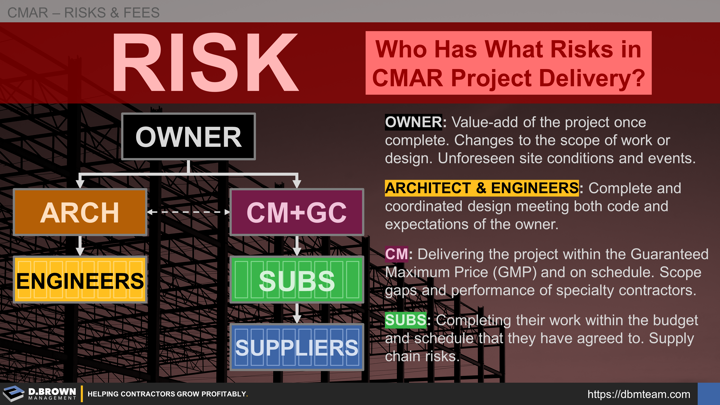“Risk is what's left over when you think you've thought of everything." - Carl Richards
Construction is risky even on the best day. All projects require the same basic cast of characters from project owner through suppliers and manufacturers. In one way or another, all parties have some risk.
It is the different project delivery methods that group these relationships together in different ways while assigning risk and fair compensation for assuming those risks.
Remember that there are a few core factors to think about when it comes to risk:
- The competitive ability to mitigate the risk. Two contractors (or other parties) may have entirely different capabilities and cost structures when it comes to managing certain risks. This may be between parties working together on a project or between parties competing for that project. Know your capabilities, the costs involved, and the probability ranges of mitigation.
- The capacity to absorb the impact of a bad event (if the risk isn't mitigated), including how well capitalized they are and insurance.
- Know that all risks will ultimately flow up if they are unable to be mitigated or absorbed. Always evaluate your downstream risks.
- The return expected for taking the risk which is based on a combination of the quality and cost of the risk mitigation capabilities plus the probability-weighted cost of the risk becoming reality even with the mitigation.
These can all be quantified with probability ranges and assigned contractually. On a construction project, the best risk managers start with detailed spreadsheets outlining the hundreds of risks, pragmatic quantification, probability-weighting, responsibilities, and key mitigation steps. Please contact us to learn more about our approach to helping contractors identify and mitigate risks at the project and enterprise level.
At a high level, the risks for all key parties on a CMAR project are:
Project Owner: Their biggest risk is the value-add of the project to their business once completed. This is where having architects, engineers, key contractors, and key suppliers/manufacturers that really know their business are incredibly valuable in the early stages of project development. This is where advanced business development and preconstruction services can be incredibly valuable for contractors. The owner is at risk for changes to the scope of work or design, which can increase the cost and schedule of the project. The owner is also at risk for unforeseen site conditions or other unforeseen events that could impact the project.
Architects and Engineers: Complete and coordinated design meeting both code and expectations of the owner.
Construction Manager and General Contractor: The CM+GC is at risk for delivering the project within the Guaranteed Maximum Price (GMP) and on time. If the project goes over budget or over schedule, the contractor is responsible for paying the difference.
Specialty Contractors: Subcontractors are at risk for completing their work within the budget and schedule that they have agreed to with the CM. If a subcontractor goes over budget or over schedule, they may be liable to the CM for the additional costs.
Suppliers: Depending on their terms with the contractor, one of the two will have risk of supply chain issues, pricing fluctuations, and quality from the manufacturers.
This is an incredibly high-level view of the risks involved.
Remember that true value is only created when the collective team from project owner through manufacturers truly eliminate more risks than other project teams. Just contractually assigning risks without actually improving the outcomes only creates transactional value.

